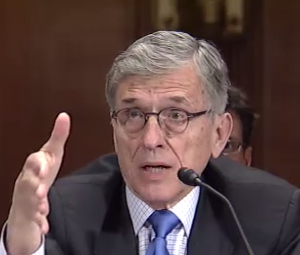Net neutrality is officially the law of the Internet land following a ruling by a federal court to let the Federal Communications Commission’s new rules governing Internet service providers (ISPs) as public utilities take effect Friday, ahead of legal challenges to repeal them.
The D.C. Circuit Court of Appeals denied a motion Thursday afternoon to delay the implementation of the rules, scheduled to take effect midnight Friday, until a collection of legal challenges brought by ISPs and industry lobbyists are decided in federal court.
“While we’re disappointed the court declined to grant our stay request, we recognize that the bar for obtaining a stay is exceptionally high,” U.S. Telecom, an industry group challenging the rules alongside CenturyLink and Alamo Broadband, said in a statement Thursday.
“As we pointed out in our request for stay, the FCC and Congress have long agreed that this critical service, which is fundamental to consumers’ daily lives, should be lightly regulated to continue the enormous investment and innovation that has enabled the Internet-related economy to thrive. To shift course backward to yesterday’s telephone regulation not only makes little sense, it isn’t legally sound.”
In a further move praised by the industry, the court decided to expedite consideration of those challenges and make a final round of rulings on the regulations, which reclassify ISPs as common carrier public utility services under Title II of the 1934 and 1996 Telecommunications Act.
“This is a huge victory for Internet consumers and innovators!” FCC Chairman Tom Wheeler said following the court’s ruling. “Starting Friday, there will be a referee on the field to keep the Internet fast, fair and open.”
The rules, proposed by Wheeler earlier this year and adopted along a partisan 3-2 commission vote in February, prohibit ISPs from blocking or throttling Internet traffic and brokering deals with content providers like Netflix, Amazon, Google-YouTube and others to pay more for faster, prioritized service.
They also give the FCC regulatory oversight of everything from the rates ISPs charge connected networks and consumers for service to the cybersecurity protocols they must uphold to safeguard consumer data — powers industry representatives, Republicans in Congress and on the commission itself argue threaten network innovation, expansion, and rights.
“Because President Obama’s plan to regulate the Internet is already harming broadband investment and deployment, I am pleased that the D.C. Circuit will be hearing the appeal of President Obama’s plan on an expedited basis,” Republican FCC Commissioner Ajit Pai said after the court’s announcement.
“Although I am disappointed that the court did not stay the rules pending its review, this development was not unexpected. The bar for granting any stay is quite high, and I am pleased that the court did not suggest that the rules are in fact legally valid.”
Despite the three-judge panel’s decision to expedite the issue, it will take the next year to run its course through the federal court process.
“Today simply marks the beginning of a protracted legal fight over the legality of the FCC’s takeover of the Internet,” Berin Szoka, president of the conservative Washington technology lobbying group TechFreedom, said in a statement.
“If the FCC loses only on its glaring process failures, the court will simply order the FCC to start over again with a new rulemaking, and it will be at least two years before we get an appellate decision on the merits. If the FCC loses on the merits of its reinterpretation of the 1996 Telecom Act, the fight will shift to the Supreme Court, which could take years.”
In the meantime, ISPs will have to submit to FCC authority in all matters relating to the Open Internet Order.
“While the courts sort this mess out, the dark cloud of legal uncertainty cast over the Internet will be slowing innovation, curbing investment, and harming consumers,” Szoka continued. “Rather than wait on the courts, Congress should step up and end this fight the way it should have been ended a decade ago: with narrow legislation that addresses core concerns about transparency, blocking and discrimination while taking Title II off the table forever.”
Republicans in Congress are already pursuing a number of legislative avenues to reform the FCC rulemaking process that led to the adoption of the Open Internet Order before it was released publicly, and delay the implementation of the rules themselves through the appropriations process until after the courts have made a final ruling.
“The courts’s stay denial was disappointing, but not unexpected,” Internet telephone entrepreneur Daniel Berninger, who filed his own stay request last month, said in a statement.
“We drew a panel with two Obama administration appointees and it was unlikely the liberal majority was going to overturn one of this administration’s signature policies. The court said in summary, ‘we plan to ignore the order’s impact on the entrepreneur, and the economy as a whole, as this case makes its way through the courts.’ The ‘we plan to ignore you’ phase may last a while, but I promise the voice of the entrepreneur — the people responsible for new communication services and infrastructure innovation — will be heard.”

